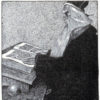To use an example from Semitic sorcery. In Semitic sorcery if you wanted to cause jealousy between a married couple, you could communicate with the spirit known as Ashmedai who was a notorious horn dog, and his behavior in their life would cause them to split. That is an example of negative sorcery.
I don’t experience jealousy, and often pondered why as I see everyone around me does. Then he would influence your partner, thus they say of these spirits that they go about as a lion, seeking whom they may devour.
An example of positive sorcery. One could contact Berith for the protection of precious things and people. Berith was symbolized as a scarab and may have had an Egyptian origin, and one could contact Baal-peor for inspiration in matters of money or trade as well as invention and skill with weapons. Baal-peor was symbolized by phallus, and would only come later to be associated with his followers habit of using dung to fertilize their fields. There was some cultural jealousy there.
Is wizardry the same as sorcery? No. Wizardry was utilizing the link between words and language in the form of stories and poems. To change reality, a wizard could sing something into existence. They were hermits who dedicated all their time to understanding the power of the word and the voice.
How does sorcery summon their magic then? With words or just movements? They used trance most often, and image making. The term talisman meant magicians marks. It was a reference not to wizards but to sorcerors, so a sorceror was also often an oneiromancer, dealing with dreams.
Sorcerors use marks like the runes? Yes.
Do you think females are better magicians than males? Females are less driven by power, I think. I think females make different magicians than males. Women tend to be better at the cycle of creation and attuning to natures rhythms. Men tend to be better at the cycle of destruction and rituals of enforcement of will.
Do both men and women use sexual magic? They do, and to different degrees in different cultures. In Norse culture, a man who practiced magick was seen as unmanly because they also tended to be willing to submit to women sexually and in domestic affairs as well.
There are other kinds of men. There were and to some degree still are the wild ones, the brujo, others. Good luck seducing a sadhu, or any of any number of the male traditions. The vaer lokur were wild and visceral. They also were the spiritual guides of the berserkers.
Your thoughts are welcome. Be well friends.
Travis Saunders
Dragon Intuitive
~science,mysticism,spirituality~



Leave a Reply